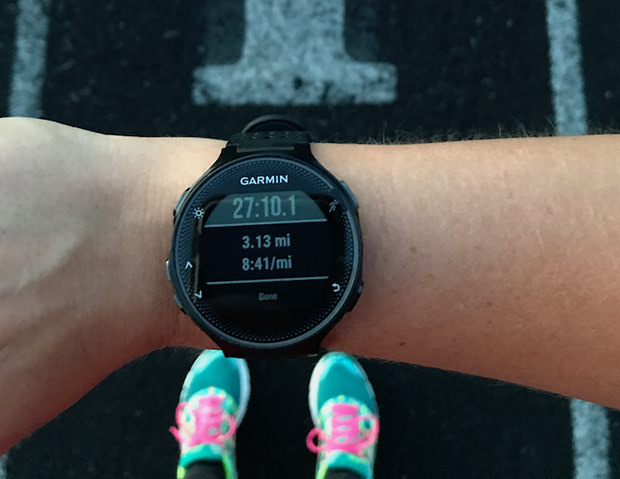
To Taper Or Not To Taper
Posted on 20 Oct, 2021

You have just put in endless weeks of training for your half-marathon or marathon. Each week, your mileage increased. You are feeling healthy, strong, and confident. You glance at your training schedule two weeks out, but wait... That can't be right. You are ONLY running how many miles?
You have reached the TAPER period of your training. And as counter-intuitive as it may seem, the taper can be one of the most beneficial parts of that training
What is a Taper?
 A taper is the period of time before a race where the mileage ran is reduced in preparation for the event. The general rule of thumb is taking it easy for 7-14 days prior to a half-marathon or marathon. 5-7 days is enough time for a shorter race or event.
A taper is the period of time before a race where the mileage ran is reduced in preparation for the event. The general rule of thumb is taking it easy for 7-14 days prior to a half-marathon or marathon. 5-7 days is enough time for a shorter race or event.
However, a taper doesn't mean that you completely stop running all together.
While it's true that your mileage is reduced during a taper, it doesn't mean that your intensity should be reduced. A taper is not a time to relax so much that all of your runs are run at an "easy" pace.
This is not to say that "easy" runs are not important either. Easy runs help stretch sore, achy muscles. They aid in healing, both body and soul. Easy runs remind us WHY we enjoy running. There is no pressure of speed work or time. Just pure joy.
But don't let your taper become 2 weeks of easy runs. You are still training for a reason. Maybe it's a new PR. Or to complete a distance you have never covered before. Either way, trust the process and taper the right way.
Benefits Of A Taper

Reduced Risk Of Injury
Lower mileage equals lower stress on the body. Lower stress on the body decreases the chance of injury prior to your big event. Or if you are struggling with an injury that occurred during training, this taper period provides some much needed recovery time to allow you to be in top form come race day.
More Time To Treat Body Right
Shorter training sessions allows you more time to indulge in pampering yourself. It provides you with time to stretch, foam roll, soak, or meditate. (Because you know that we are ALL guilty of skipping out on some serious stretching after some tough runs.) Reduced time running allows us to participate in activities that we normally don't make "time" for after a workout.
Restoration
After weeks of hard training, your body has been depleting it's stores of energy and nutrients. By cutting back on your training during this period, your body has time to replenish fully what it needs to get you across that finish line. A full tank of gas in a Ford Fusion will get you further than a half-tank of gas in a Ferrari.
Increased Desire To Run
After all the miles you are logging this training season, a dramatic reduction should increase your ambition to run more. Running long distances has become a habit. Once you take that away, your body craves it. Come race day, you will be primed and fired up to tackle the distance.
More Time To Prepare
Decreasing your mileage at the end of your training session allows you more time to prepare for the run. Not having to wake up early to fit a in long workout allows you to get some much needed sleep to help heal your body. Having more time also allows you to prepare healthy, nourishing meals to fuel yourself better. Take this time to get ready for the event. Scope out the run's route if you haven't already. Prepare mentally for the challenge. Pack your bags if you have to travel for the run. Pick up some "extra" run necessities.
Disadvantages Of A Taper?

Decreased Belief In Ability
With reducing your mileage, the belief in your ability may also decrease. Especially if you happen to have a particularly difficult "short" run. Running is strange. One day, a mile may seem like it's impossible when the next day, a mile feels like nothing. Don't believe your inner doubts. You haven't spent the last few months training just to let your mind trick you into failing.
Too Long Of A Taper
Resting too much during your taper can hamper your results. You still need to push yourself in order to keep your endurance and momentum intact. Suggestions are 7-14 days of tapering for a half-marathon or marathon training, while a 5-7 day taper is plenty of time for a 5k-10k.
Too Much Rest
The taper period isn't a "Get Out Of Running Free" Card. You still must put in the work to get the results. Even if the taper calls for a 1-2 mile run that you may see as unhelpful and unnecessary, skipping the workout only hinders your progress. Each run is important, no matter the distance.
Decreased Intensity
Decreasing the amount of time spent running also means decreasing the intensity of said runs, right? Wrong. Interval training is still as important and productive during shorter distances as it is to longer training sessions. Interval training helps improve endurance, so don't just go through the movement of the training. Push yourself if the workout calls for you to do so.
Restlessness
Those of you that use running as a form of stress-relief may find yourself a little restless during the taper. Find other ways to rid your body of the stress. Yoga, meditation, walking, or listening to music can all be great ways to help you relax while still sticking to your training plan.
A successful taper also includes proper nutrition, sleep, and hydration. And the tapering process is also highly individualized. Some runners believe that a taper hurts their progress while others would never have a training plan without a taper. Find what works for you and crush your goals!
Must Read Books For Runners


by Peter Magill


by Matt Fitzgerald

 Are You Running Too Much?
Are You Running Too Much? Core Workouts For Running
Core Workouts For Running The Pros And Cons Of Running On Different Surfaces
The Pros And Cons Of Running On Different Surfaces Are eggs good or bad for you? The final verdict
Are eggs good or bad for you? The final verdict










